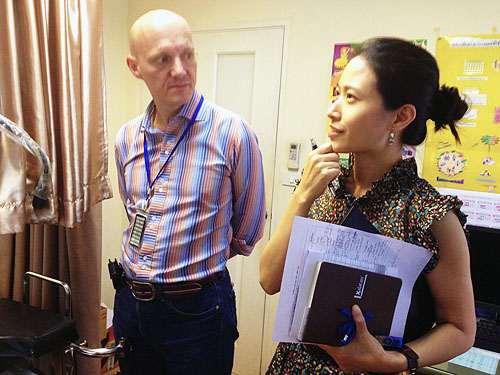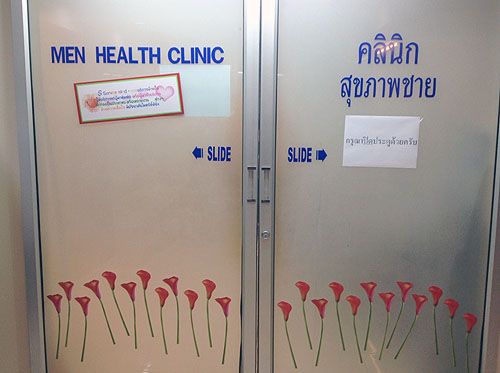Posted by Lucile Scott on October 24, 2013
In Thailand, where the HIV rate among the general population is 1.1%, prevalence among MSM increased from 17% in 2003 to 29% in 2011—one of the highest rates among GMT in the world. But Thailand is also a nation where GMT face less discrimination and stigma than in other countries in the region, making it an ideal home for several organizations dedicated to finding the most innovative and effective responses to HIV among GMT, not only in Thailand, but across the Asia Pacific.
“In Bangkok you are free to be who you are, but MSM are not the government’s priority,” says Midnight Poonkasetwattana, Executive Director of the Asia Pacific Coalition on Male Sexual Health (APCOM), which is headquartered in Bangkok. APCOM and its partners plan to use their collective voice to change that and create the political will to better respond to HIV among GMT region-wide.

Dr. Nicolas Durier, research director at TREAT Asia, and Dr. Nittaya Phanuphak Pungpapng, deputy director of the Thai Red Cross AIDS Research Center, discuss their program to better treat HPV in HIV positive GMT in Asia.
Another Bangkok-based organization, the Purple Sky Network (PSN), brings together national organizations fighting HIV among GMT in Asia’s Greater Mekong Sub-region—consisting of Cambodia, China’s Guangxi and Yunnan provinces, Lao PDR, Myanmar, Vietnam, and Thailand. PSN was created in 2006 with amfAR support and was formerly based at amfAR’s TREAT Asia offices. “At the time, only Thailand already had a strong national GMT network,” says Rapeepun (Ohm) Jommaroeng, Executive Director of PSN. “TREAT Asia helped formulate and strengthen technical working groups in the rest of the countries in the Greater Mekong Sub-region and eventually helped establish the Purple Sky Network.”
Through this collaboration, PSN helps improve on-the-ground HIV programming for GMT in each member country. “Having a sub-regional platform helps countries in the same region with similar HIV situations to learn from each other in-depth,” says Ohm. It also strengthens partnerships among government agencies, community organizations, and international non-governmental organizations working in the area.

Midnight Poonkasetwattana at APCOM’s Bangkok offices.
APCOM brings together sub-regional networks like PSN and country-level GMT organizations to amplify the regional GMT voice even more. “Sometimes it is very hard to advocate at a country level, especially if you might be criminalized,” says Midnight. “A regional network can do that without fear of repercussion on a country level.” He adds that regional grants can also help provide for GMT programming in countries including Pakistan, Malaysia, and Afghanistan, where, due to national regulations and cultural conditions, it might not otherwise exist.
Additionally, APCOM studies the best HIV-related practices in each country and uses that collaborative knowledge and voice to impact policy and funding decisions made by international organizations. “We had a meeting last week with WHO and UNAIDS about community-based testing,” says Midnight. “We did a case study looking at things that were already happening at the country level that could be great resources to other countries, and we said, ‘Look at this.’”

The entrance to the Men’s Health Clinic at the Thai Red Cross.
Organizations like the Thai Red Cross and the HIV Netherlands Australia Thailand Research Collaboration (HIV-NAT) are working to improve the quality of medical treatment HIV-positive GMT receive across the region. For instance, the Thai Red Cross is currently using amfAR funding to improve screenings and treatment of precancerous HPV lesions found in GMT—which their study shows HIV-positive GMT are twice as likely to have as HIV-negative GMT—and to then provide clinicians in Indonesia, Singapore, and Malaysia with that knowledge and with the equipment they need to use it.
“No government, organization, or agency can end HIV among GMT on their own,” says Midnight. “So much has happened in our region already, and it is time to double and triple our efforts, or we’ll miss this opportunity for a comprehensive regional response. The rates are already particularly high in Thailand.”